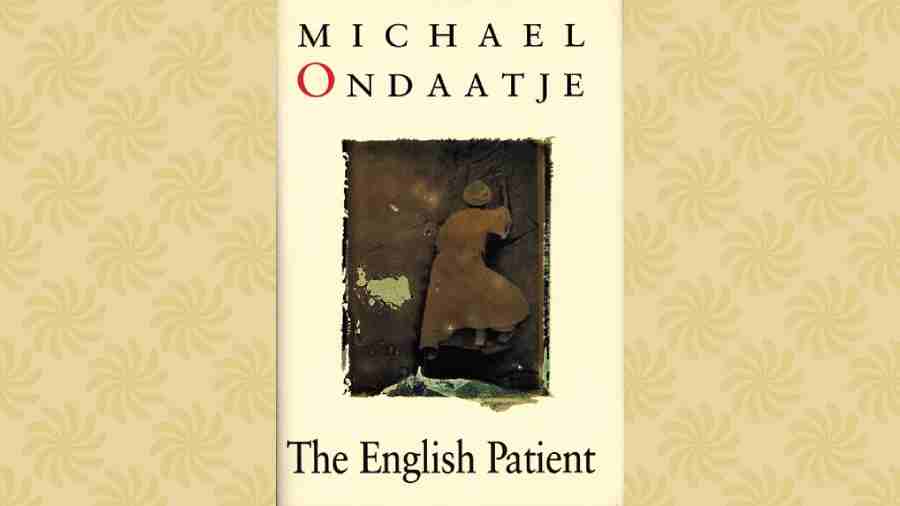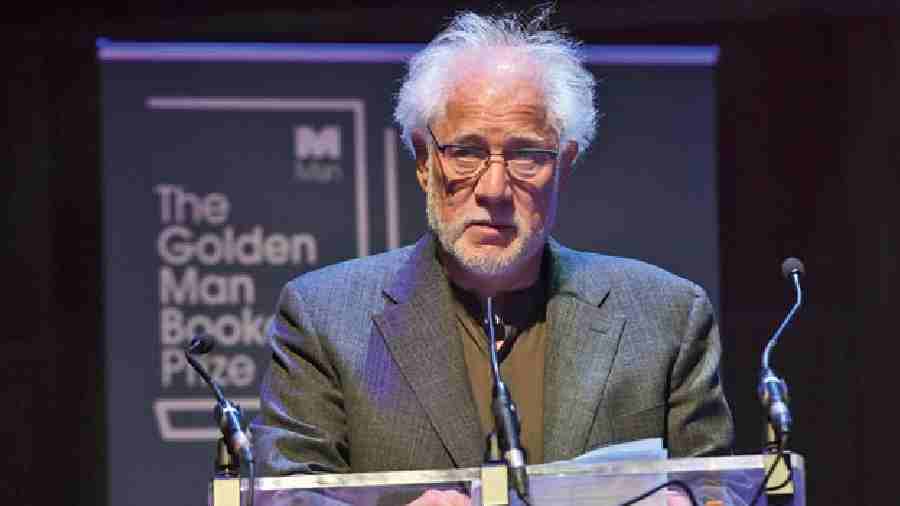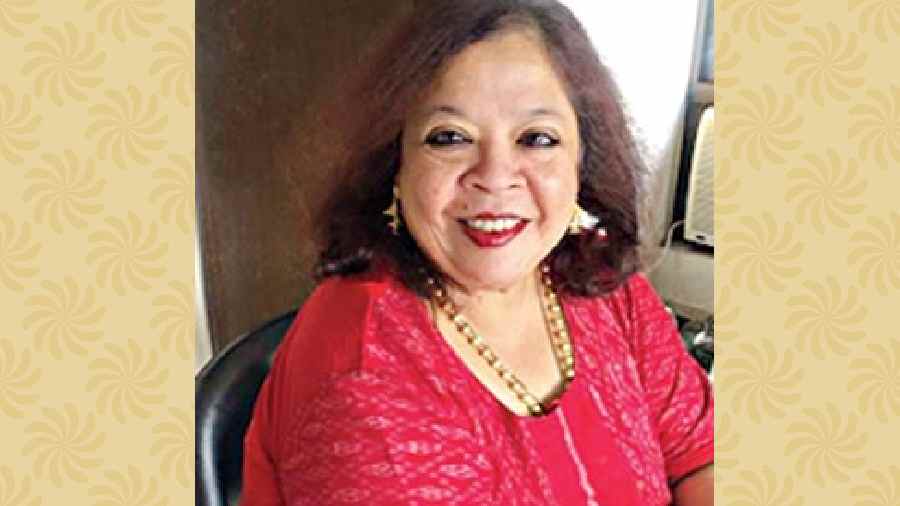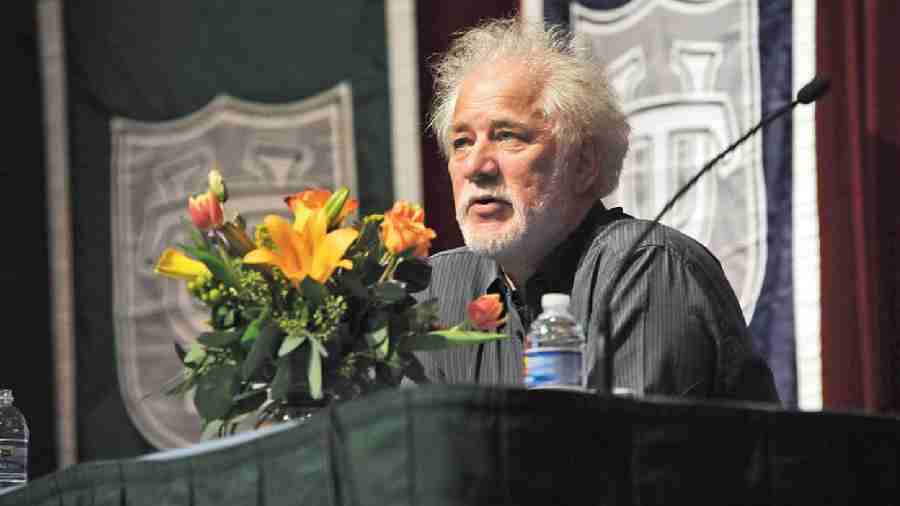Turning the spotlight on the diasporic Sri Lankan-Canadian Michael Ondaatje and celebrates an uncommon writer who catapulted to fame with his iconic bestselling novel The English Patient, 30 years old this year. Winner of the Golden Man Booker Prize in 2018, a one-off award voted by the public, commemorating the 50th anniversary of the prize, it has found a place on the syllabi of English departments worldwide, from Calcutta University to the University of Toronto.
On September 12, Philip Michael Ondaatje turned 79. One of the finest living storytellers, who touches the wounds of those buried emotions that reside deep in the recesses of the reader’s mind, is a self-professed “mongrel” and “burgher”. A mixed-race Eurasian, Ondaatje reigns as one of the brightest stars of world literature today.
Meticulous in his historical research and a kind of prophet of compassion and understanding beyond spatial and temporal boundaries, who salutes diversity in a quickly evolving world, Ondaatje lives the dream of every aspiring immigrant. Though he describes himself as a Canadian writer, Ondaatje is clear: “I don’t think I’m a north American solely; Sri Lanka is a place I love and feel very much part of.”
According to family lore, a Tamil forebear came from south India in 1600 to Sri Lanka as a doctor, healed the Dutch governor’s daughter and was rewarded with a Dutch wife and the spelling of his name. When his wife died, he married a Sinhalese woman. “My background is a real salad, so it’s difficult to know who I am,” Michael Ondaatje laughs. His fragmented and chutnified life finds an inventive invocation through the different genres he embraces in his texts: journals, diaries, photographs, fiction, poetry, conversation.
Ondaatje takes his time to craft his stories. Unlike many writers of our times, he seems in no rush to publish in a frenzy. It takes him on an average six to seven years to complete a work. Thus in 1976: Coming Through Slaughter; 1982: Running in the Family; 1987: In the Skin of a Lion; 1992: The English Patient; 2000: Anil’s Ghost; 2007: Divisadero; 2011: The Cat’s Table; 2018: Warlight.
Coming Through Slaughter, his first prose work, fictionalised the life of the jazz pioneer Buddy Bolden, the cornetist in turn-of-the-century New Orleans who went mad on a public parade. It shows the background of brothels and knife-fights in which jazz flourished, and its syntax carries the music. “Of all the arts, jazz is the one I envy the most,” he says. “It’s communal, free, you can improvise. If I could be Fats Waller, I wouldn’t be writing.”
Ondaatje’s literary career began with his poetry in 1967, publishing The Dainty Monsters, and then in 1970 came the critically acclaimed The Collected Works of Billy the Kid. However, he is more recently recognised for his nationally and internationally successful novel The English Patient (1992), which was adapted into a film in 1996, directed by his now close friend Anthony Minghella. “I think in images,” says this wordsmith, who began as a film-maker, then a poet, and finally a novelist — whose shifting perspectives and non-linear technique of storytelling celebrates a kind of orality, in keeping with the spoken word genre of storytelling of ancient traditional cultures. He put his Booker winnings into the creation of the Gratien prize (named after his mother Doris) for Sri Lankan writers based on the island.
Ondaatje’s own uprooting has been matched by a restless creativity. “Moving, you learn twice as much; it doubles you in some way, like living three or four lives,” he says. “There’s a parallel between the writer and the migrant: in a way, writers are immigrants if you’re writing about a new place. It’s exciting and terrifying to start anew in a new land, with a new language and new rules.”
I first read Ondaatje nearly 25 years ago, in our childhood home in Kolkata, with my father, with whom I discovered Ondaatje when we read and discovered Ondaatje’s dazzling intimations of mortality. An intimacy developed with his works that connected me to the gaping hollows that filled Ondaatje’s heart, a hollow he tried to explore in the powerful presence of his absent father, the brilliant Mervyn Ondaatje, who was an incurable alcoholic. Mervyn Ondaatje got into Cambridge but preferred to drink champagne instead of attending class.
“‘The great hurt of everything’ is also at the heart of Ondaatje’s vision, though we can often narrow it down to the essential, underlying donnee, which is the break-up of his parents’ marriage, their divorce and his subsequent childhood exile from Ceylon in 1954, an exile that also included a permanent separation from his father Philip Mervyn Ondaatje,” argues Sam Solecki, considered the most knowledgeable and perceptive of scholars on Ondaatje’s poetry, in his seminal work Ragas of Longing: The Poetry of Michael Ondaatje.
After Ondaatje’s parents separated, his mother moved to England with his brother Christopher and sister Janet. He and his sister Gillian stayed in Ceylon with aunts and uncles. Ondaatje joined his mother in the UK at the age of 11. The writer Ondaatje’s mother Doris Gratien kept her young family afloat in the UK by working in hotels.
Ondaatje has said when he moved to England he became preoccupied in this very new country and, in a sense, forgot about his childhood in Sri Lanka. But England was also the playground where he fell in love with jazz, often slinking away after school to dance or listen to jazz in the music bars. He immigrated to Montreal when he was 19 and received a B.A. in English from the University of Toronto in 1965 and an M.A. from Queen’s University, Canada, in 1967.
In conversations Ondaatje admits that in his mid-30s he realised he had slipped past a childhood he had ignored and not understood: “I literally couldn’t afford to go to Sri Lanka; it was something very present but far away.” In Running in the Family he found himself dreaming of Asia in frozen Toronto, and while teaching at university spent a sabbatical in Sri Lanka in 1978. “I’d lost my childhood, so I had to reinvent it. Going to places starts you remembering things.”
“All great fiction is about families,” Ondaatje said in an interview, some years ago. “It is also about families we make,” he said. Ondaatje is one of the sharpest knives in the drawer and though he is not the obvious activist who wears his activism on his sleeve, there is an enormity in the ontology of his abhorrence for war or overwrought nationalism.
In Anil’s Ghost he says: “This is when he stopped believing in Man’s rule on earth. He turned away from every person who stood up for a war. Or the principal of one’s land, or the pride of ownership or even personal rights. All of those motives ended up somehow in the arms of careless power. One was no worse nor better than the enemy.”

Soon after my father died, Ondaatje’s fractured relationship with his father haunted me. Since he left Sri Lanka, Ondaatje pined for a father he would never meet again. Mervyn Ondaatje died alone, as did the father of one of the main characters in the novel The English Patient — Hana’s father, Patrick

Michael Ondaatje speaking after winning the Golden Man Booker Prize at The Royal Festival Hall on July 8, 2018, in London, England
In another avatar, the persuasive, and perhaps the most seductive of his works, The English Patient, he states very simply: “We die containing a richness of lovers and tribes, tastes we have swallowed, bodies we have swum into… I wish for all this to be marked on my body, when I am dead. I believe in that kind of cartography. To be marked by nature. Not just to label ourselves on a map like the names of rich men and women on buildings. We are communal histories. Communal books. We are not owned or monogamous in our taste or experience.”
Soon after my father died, Ondaatje’s fractured relationship with his father haunted me. Since he left Sri Lanka, Ondaatje pined for a father he would never meet again. Mervyn Ondaatje died alone, as did the father of one of the main characters in the novel The English Patient — Hana’s father, Patrick. I had been reading Letters and Other Worlds, a poem from Ondaatje’s early collection Rat Jelly (1963-1978) and the words sang like a persistent tune in my head. For nearly 10 years now, I retread this poem which resonates with my own experience of being thousands of miles away teaching the fall semester at the University of Toronto, and my father dying alone in a hospital bed in Kolkata, in 2012, among strangers:
“My Father’s Body was a globe of fear
His body was a town we never knew…
He came to death with his mind drowning
On the last day he enclosed himself
in a room with two bottles of gin, later
fell the length of his body
so that brain blood moved to new compartments
that never knew the wash of fluid
and he died in minutes of a new equilibrium.”
Ondaatje’s relevance to the new generation of immigrant is rich and meaningful, as I found first-hand. In 2009, young Sri Lankan Tamil Canadians, peacefully but persistently, protested the brutal killings in Sri Lanka, closing off the access to highways by occupying the ramps that connect Toronto to the rest of Canada. This brought Toronto to its knees and also caused an enormous pushback by Anglo Canadians, including students in my class at the University of Toronto.
I was teaching a full year course on Michael Ondaatje’s fiction in 2009 and the classroom turned into a battlefield. Very rarely in the North American academia had I encountered such anger directed at a specific community. We were beginning to discuss Anil’s Ghost, Ondaatje’s contested novel about the bloody battles between the Singhalese and the Tamils with many Tamils being killed in numbers.
One of the Sri Lankan-Tamil-Canadian students was visibly shaken that morning. When one of the Anglo Canadian students proclaimed loudly, “why don’t you go back to where you came from? You bring all this baggage and spoil the peace in Canada. The Sri-Lankan-Canadian student, who was usually polite and quiet in class, broke down and shouted uncharacteristically: “What would you feel if you couldn’t get an answer from your grandmother’s phone after calling her all night. And you knew that she might have been part of killings in her neighbourhood in Jaffna?”
The silence in the classroom was as loud as a scream. Then, within a minute the atmosphere is the classroom had undergone a change that I could not fathom. The Anglo Canadian girl who had flung the tirade against the Sri Lankan Canadian classmate came and embraced her and there were tears running down both their faces.
“If it wasn’t for Ondaatje’s Anil’s Ghost, we could never understand how real the civil war is in Sri Lanka, and how far it travels,” said one student. “This is surreal, how the theoretical issues of the diaspora we are taught affect us all because we are all effected by globalisation,” said another Anglo Canadian student. His trenchant style and compelling idea that history is not something going on outside, but unfolding inside us, is the hook that draws in his readers across geographies and generations.
Pictures: Tulane Public Relations and Getty Images

Julie Banerjee Mehta is the author of Dance of Life and co-author of the bestselling biography Strongman: The Extraordinary Life of Hun Sen. She has a PhD in English and South Asian Studies from the University of Toronto, where she taught world literature and postcolonial literature. She now lives in Kolkata and teaches English at Loreto College
